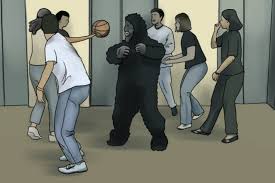The Weekly Reflektion 17/2025
Sometimes we can be so focussed on one specific issue in a situation that we fail to see what is actually happening. This becomes particularly concerning when others see the same situation and cannot understand why we don’t see what they see.

What do you have your selective attention on?
Selective attention is the cognitive process of focusing on one particular thing while ignoring other seemingly obvious thingshappening at the same time. It is related to the way the brain filters out unnecessary information so you can concentrate on what’s important for you at the moment. At a noisy party, you can still focus on a friend’s voice even though there are dozens of conversations around you (this is known as the “cocktail party effect”). This focus can be disturbed, for example, if someone else in the room mentions your name. This is likely to break your concentration and make you look around for who said it and why.
The Invisible Gorilla experiment, developed by Simons and Chabris in 1999, is a classic example of selective attention. Six people are playing basketball, and the participants in the test were asked to count the number of basketball passes made by the players wearing white. The test was depicted as a competition just to appeal to the participants’ competitive instincts. The test duration was about 30 seconds. When the film finished the participants were asked how many passes they had counted. They were then asked about the gorilla. Many did not understand the question and claimed there was no gorilla in the film. The film was rerun without any requirement to count the number of passes. After 12 seconds a person dressed in a gorilla suit walked through the scene and after banging his/her chest in full view, walked off. The gorilla was visible for about 10 seconds. Some of the people that failed to see the gorilla refused to believe that it was the same film. Even when a separate film of them watching the original film was shown to them, they were unconvinced.
Our brains cannot focus on two demanding tasks at once. The more attention we give to one particular issue, for example counting basketball passes, the less likely we will notice other issues, even though these may be patently obvious for the people around us. Attempts to handle two or more demanding tasks at once can lead to cognitive overload and our brain will then search for ‘heuristics’ to handle the overload. These are mental shortcuts or rules of thumb that simplify complex issues and allow our brains to cope. Unfortunately, this may lead to illogical rational reasoning and incorrect conclusions. In extreme cases to accidents or even Major Accidents.
The management at the BP Texas City refinery following the BPAmoco merger in 1999, were required to reduce costs to meet corporate objectives. They were counting the number of dollars while the need for a remote flare, improvements in operations and maintenance practices and poor culture were banging their chests in full view. The Texas City disaster on 23rd March 2005 became their gorilla in the room.
The management in a company cannot allow themselves to be driven by selective attention. You may win the prize for counting but you will probably sacrifice something much more important.
